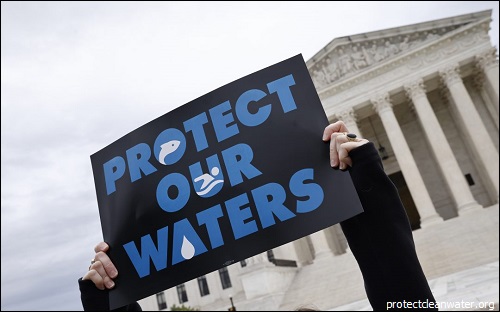
|
|

|
|
| July 27, 2024 |
|
Supreme Court weakens clean water protections 
WASHINGTON - The Supreme Court weakened protections in the Clean Water Act Thursday, a ruling that narrows what wetlands are protected under the law, which environmental advocates warn could have wide-reaching environmental impacts and lead nearly half of the country’s wetlands to be open to damage.
Sackett v. Environmental Protection Agency was brought by an Idaho couple who has been in a years-long dispute over building property on their land, which the federal government has said they cannot do without a permit because the land is a wetland protected under the Clean Water Act. The justices ruled unanimously that the couple had the right to build on their land, but was split 5-4 when it came to the Clean Water Act more broadly, with a conservative majority of justices narrowing the scope of the law. The Clean Water Act, a landmark law enacted in 1972 that established water quality standards and regulated pollutants, protects “the waters of the United States,†but the court ruled that only applies to wetlands if they’re adjoining “traditional navigable waters†like rivers, oceans, streams and lakes. The court’s three liberal justices and Justice Brett Kavanaugh disagreed, with Kavanaugh writing that the new definition of what’s protected under the Clean Water Act “departs from the statutory text, from 45 years of consistent agency practice, and from this Court’s precedents.†The new test will remove protections from many wetlands that have long been regulated, Kavanaugh wrote, “with significant repercussions for water quality and flood control throughout the United States.†EPA Administrator Michael S. Regan said in a statement he was “disappointed by today’s Supreme Court decision that erodes longstanding clean water protections†and the agency would “carefully review the Supreme Court decision and consider next steps,†reiterating its commitment to a “durable definition of ‘waters of the United States’ that safeguards our nation’s waters, strengthens economic opportunity, and protects people’s health.†The court’s ruling weakening the Clean Water Act could result in half of the wetlands in the lower 48 states losing federal protections, advocacy group Earthjustice warned prior to the ruling, affecting water quality, local wildlife and the impacts of extreme weather, as wetlands help to control floods and rainfall from major storms. The ruling removes federal protections from wetlands that may be somehow connected to major bodies of water without totally adjoining them, which Kavanaugh noted in his concurrence “still play an important role in protecting neighboring and downstream waters, including by filtering pollutants, storing water, and providing flood control.†Among the bodies of water that could be affected by the ruling, Kavanaugh noted, are the Mississippi River—as levees that protect the river from flooding may now be excluded under the Clean Water Act—and the Chesapeake Bay. The court’s ruling comes a year after it similarly curbed the EPA’s power in a case last term that concerned emissions, with justices limiting the agency’s authority to create caps for greenhouse gas emissions under the Clean Air Act. (Source: Forbes) Story Date: May 26, 2023
|